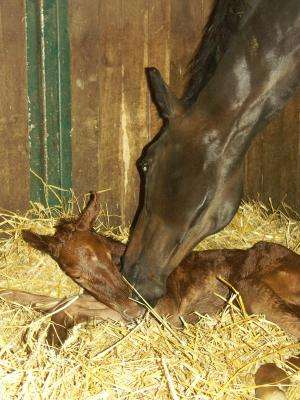Helping horses come to term

It is not only humans that sometimes experience difficulty having children. Horses too have a low birth rate, with many pregnancies failing within the first few weeks after conception. The reason is currently unknown but recent research by the team of Christine Aurich at the University of Veterinary Medicine, Vienna (Vetmeduni) suggests that a particular class of blood cells may be involved. The results have just been made available online in the journal Reproduction, Fertility and Development.
As any nervous first-time mother will confirm, the initial three months of pregnancy are the most risky time: many expectant women are reluctant to inform their friends or colleagues that they are pregnant until after this period is past. It is less well known that horses suffer from similar problems, with a considerable number of pregnancies failing to progress beyond the first five weeks. The explanation is still unclear but may relate to a problem with the mare's immune system, as the latest work in the group of Christine Aurich in the Vetmeduni's Centre for Artificial Insemination and Embryo Transfer strongly suggests.
The fertilized egg, or conceptus, obviously contains contributions from the stallion as well as the mare, which means it somehow has to avoid being recognized and attacked by the mare's immune system. Horse breeders talk about maternal tolerance of the conceptus and horses – as other animals – have a variety of mechanisms to enable fertilization and a successful pregnancy. Maternal tolerance probably depends on wide-ranging changes to the maternal immune response. But what makes some mares better than others at adapting their immune systems?
There are indications from work in humans and mice that a particular class of immune cell, the so-called regulatory T cells or Tregs (pronounced "tea regs"), might somehow be important in maternal tolerance. Aurich and her colleagues have now developed a highly sensitive assay to measure the proportion of Tregs in the blood of horses. They used their new technique to investigate over 100 mares that were presented for artificial insemination, correlating the results with the outcome of the resulting pregnancies.
Of course, not all of the animals conceived. The scientists could find no association between the level of Tregs in the mares' blood with the success of the insemination procedure. However, they did observe clearly lower numbers of Tregs in the blood of horses that suffered an early loss of pregnancy compared with those that either aborted much later (for whatever reason) or gave birth to live foals. The results suggest that high numbers of Tregs might somehow be required to suppress the mare's natural immune reaction against the conceptus. In other words, low levels of Treg cells in mares might cause pregnancy loss in the five weeks after fertilization.
The differences in the levels of Tregs between horses in the "successful pregnancy" and the "unsuccessful" groups were too small to be useful to predict whether an individual mare is likely to suffer early pregnancy failure. Nevertheless, the results may help breeders solve the problem. There is evidence from human medicine that oestradiol may enhance the function of Tregs during pregnancy and treatment with this hormone could possibly benefit mares prone to losing the conceptus. Another possible course would be to expose mares to the stallion's semen before implantation, which might increase the number of Tregs in the blood and the animal's tolerance to the conceptus, thereby helping avoid early pregnancy losses.
Aurich is optimistic: "A number of reasons have been proposed to account for early pregnancy failure in the horse but our work suggests that a low level of Tregs may actually be among the most important factors. It can only be a matter of time before we find out how to solve the problem."
More information: Aurich, C. et al. Low levels of naturally occurring regulatory T lymphocytes in blood of mares with early pregnancy loss, Reproduction, Fertility and Development. dx.doi.org/10.1071/RD13012
Provided by University of Veterinary Medicine -- Vienna















